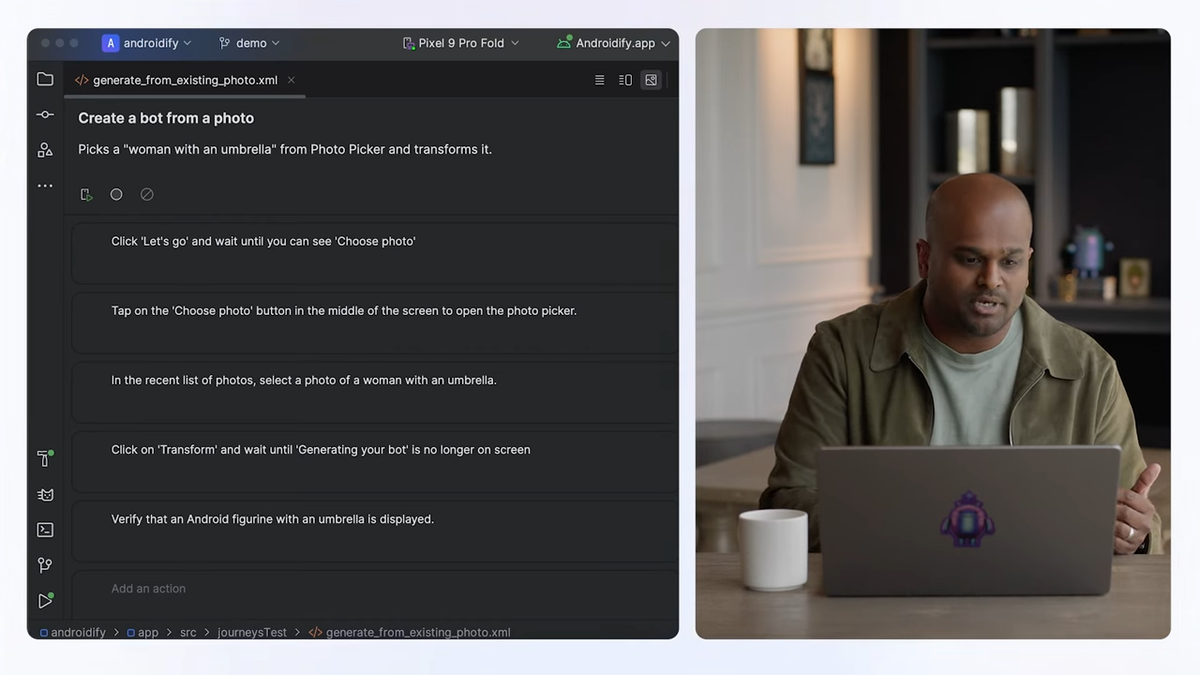Android Studio adds AI-powered testing and smarter crash diagnostics
If you're coding an Android app right now, stop immediately and see what Google promises.

Now that Google's I/O 2025 conference is over, it's worth noting that the Big G introduces several new features in Android Studio, aimed at improving the process of developing Android applications.
The latest version integrates more advanced AI tools, streamlines interface design and testing, and includes features to help developers prepare for future updates to the Android platform. These updates are intended to reduce manual work, improve app quality, and speed up development. Fingers crossed!
If you're reading this, there's a high chance that you're already familiar with Android Studio, but let's explain things for those who are reading this out of curiosity. Android Studio is the platform that helps people make apps for Android phones and tablets. Think of it like a special toolkit or workshop where app creators write the code that tells the phone (or tablet, if you like) what to do. Android Studio also helps people test the app to make sure it works well before people download it.

Now, there's a major addition: the deeper integration of Gemini 2.5 Pro, Google's latest AI model. This tool is now available within Android Studio and assists throughout the development process by offering suggestions and automating certain tasks. One of the experimental features, called "Journeys", allows developers to create tests by describing user actions in plain language. Gemini then runs these tests on physical or virtual Android devices and provides results directly in the development environment.
Android Studio also includes improvements in diagnosing and fixing app crashes. The App Quality Insights panel can now analyze crash-related code and, in some cases, suggest code changes to fix the issue. Developers can review and apply these changes within a few steps.
For user interface development, the Compose preview tools have been updated. Developers can now navigate components more efficiently, resize previews to see how layouts adjust to different screen sizes, and test UI changes more quickly. The Android XR Emulator now runs in an embedded window by default, allowing developers to build and inspect extended reality features without leaving the main interface.
Several experimental and upcoming features are also being tested. Android Studio Cloud, currently in preview, allows developers to access a virtual version of Android Studio through a web browser, removing the need for local installation.
The latest version integrates more advanced AI tools, streamlines interface design and testing, and includes features to help developers prepare for future updates to the Android platform. These updates are intended to reduce manual work, improve app quality, and speed up development. Fingers crossed!

Now, there's a major addition: the deeper integration of Gemini 2.5 Pro, Google's latest AI model. This tool is now available within Android Studio and assists throughout the development process by offering suggestions and automating certain tasks. One of the experimental features, called "Journeys", allows developers to create tests by describing user actions in plain language. Gemini then runs these tests on physical or virtual Android devices and provides results directly in the development environment.
For user interface development, the Compose preview tools have been updated. Developers can now navigate components more efficiently, resize previews to see how layouts adjust to different screen sizes, and test UI changes more quickly. The Android XR Emulator now runs in an embedded window by default, allowing developers to build and inspect extended reality features without leaving the main interface.
Several experimental and upcoming features are also being tested. Android Studio Cloud, currently in preview, allows developers to access a virtual version of Android Studio through a web browser, removing the need for local installation.
Another tool, the Version Upgrade Agent, will analyze dependencies in a project and automatically suggest and apply updates. A new "Agent Mode", still in development, is designed to carry out more complex tasks by editing multiple files and resolving related issues based on developer input.
Follow us on Google News














Things that are NOT allowed:
To help keep our community safe and free from spam, we apply temporary limits to newly created accounts: